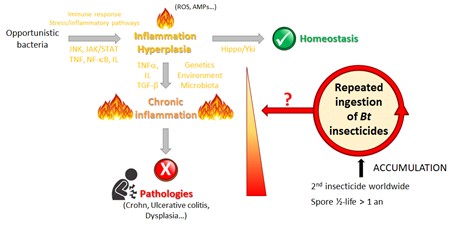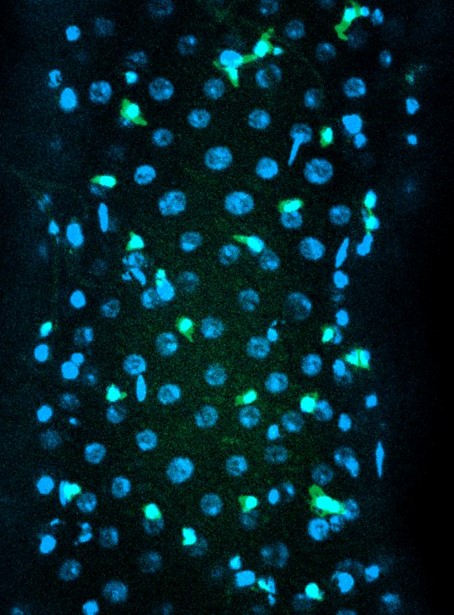Academy of Excellence "Territories, Environments, Risks and Resilience"
Evaluating whether chronic food intake of Bacillus thuringiensis biopesticides promotes bowel diseases
Our project is investigating the unintended effects of the most widely used microbial pesticide in agriculture, which is based on spores of the bacterium Bacillus thuringiensis.

Academy 3 highlight
Our work will help determine whether health measures are needed to prevent consumer exposure, such as longer pre-harvest intervals or thorough washing of fruits and vegetables. Our project assesses the “risks of agricultural products and practices to both biodiversity and human health” and is therefore in line with Academy 3 priorities.
The project
We have developed a simple, direct protocol for chronic ingestion of Bt spores that mimics natural dietary exposure to an agricultural dose. Our results show that long-term consumption of Bt-contaminated food, even at low doses, significantly reduces the lifespan of Drosophila. Our findings demonstrate that Bt spores affect gut morphology, promote dysplasia, alter septate junctions and enhance epithelial permeability. They also show that Bacillus spores germinate in the gut and that the number of vegetative cells remains constant. Additionally, we observed increased levels of inflammatory signaling pathways and reactive oxygen species. Overall, our results indicate that chronic consumption of Bt spores promotes inflammation and oxidative stress, leading to premature aging of the gut and early lethality in Drosophila.

The +
Extended to non-target insects, which account for 85% of animal biodiversity, our study suggests that highly persistent Bt spores may have unintended long-term effects on the environment.
What’s next?
Based on our results, we will extend this study to include at-risk individuals who are predisposed to, or develop, intestinal inflammation (IBD) or tumors and may be even more sensitive to Bt. We will also translate our findings to the mouse model. To this end, we have developed a collaboration with Benoit Chassaing’s team (Institut Pasteur), whose members are experts in mucosal microbiota in chronic inflammatory diseases and have studied them using the mouse model.
Project information
|
Scientific domain
Environmental and Human Health, Biology |
Key words Bacillus thuringiensis Gut inflammation Drosophila Mouse |
|
Total budget
€865,000, including €6,000 from Academy 3
|
Students involved
Aurélia Joly (PhD) Jade Finkelstein (PhD) Tiffany Marson (Master) |
| Partners
ISA - Université Côte d’Azur, CNRS, INRAE |
Project members Aurélia Joly Julie Soltys Jade Finkelstein Audrey Amate Marie-Paule Nawrot-Esposito Alexandra Brun-Barale Tiffany Marson Benoit Chassaing Armel Gallet Raphaël Rousset |

Raphaël Rousset
ISA - Université Côte d’Azur, CNRS, INRAE
Scientific promotion of the project
- Colloquium « Une Seule Santé » – February 9 and 10, 2023, Paris La Défense - France
Two Posters :
- 27th European Drosophila Research Conference – October 20-23, 2023, Lyon - France
- 34th French Drosophila Meeting – October 9-12, 2022, Sète - France

















